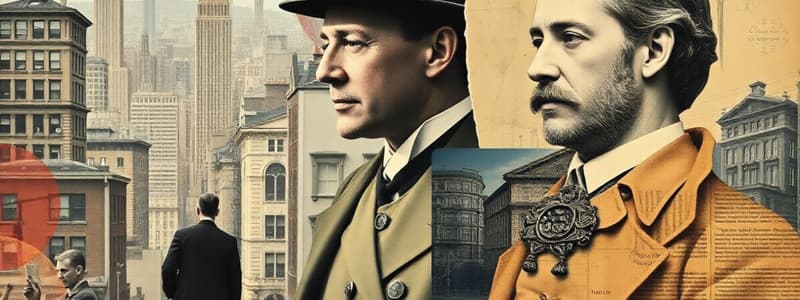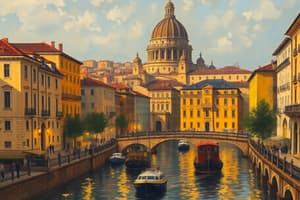Podcast
Questions and Answers
What urban planning model did Ernest Burgess propose in 1925?
What urban planning model did Ernest Burgess propose in 1925?
- Linear City model
- Concentric Zone Model (correct)
- Sector model
- Multiple Nuclei model
Which planner is associated with the City Beautiful Movement?
Which planner is associated with the City Beautiful Movement?
- Geoffrey Jellicole
- Daniel Burnham (correct)
- Frank Lloyd Wright
- Le Corbusier
Le Corbusier's contributions to urban planning focused primarily on which type of development?
Le Corbusier's contributions to urban planning focused primarily on which type of development?
- High-density development (correct)
- Suburban development
- Low-density development
- Rural development
Which of the following concepts is NOT associated with Robert Owen?
Which of the following concepts is NOT associated with Robert Owen?
What is the primary focus of Paolo Soleri's concept of Arcology?
What is the primary focus of Paolo Soleri's concept of Arcology?
Which planner's model suggests urban development around several nodes or focal points?
Which planner's model suggests urban development around several nodes or focal points?
The concept of Transit-Oriented Development (TOD) primarily emphasizes which of the following?
The concept of Transit-Oriented Development (TOD) primarily emphasizes which of the following?
Nikolai Milyutin's Stalingrad-Volgograd city plan is characterized by which of the following key elements?
Nikolai Milyutin's Stalingrad-Volgograd city plan is characterized by which of the following key elements?
Flashcards
Hippodamus
Hippodamus
The earliest known planner! Hippodamus from Miletus designed a compact city with clear organization, featuring a central agora (market/civic space) and utilizing natural springs for water.
Robert Owen
Robert Owen
Known for his 'Ideal City', Owen aimed to create communities focused on human needs, envisioning self-sufficient environments for limited populations (around 1,200 people per 1,000-1,500 acres).
City Beautiful
City Beautiful
A movement emphasizing beauty and order in urban design, often incorporating classical elements.
Concentric Zone Model
Concentric Zone Model
Signup and view all the flashcards
Sector Model
Sector Model
Signup and view all the flashcards
Multiple Nuclei Model
Multiple Nuclei Model
Signup and view all the flashcards
Urban Realm Models
Urban Realm Models
Signup and view all the flashcards
New Urbanism or Walkability
New Urbanism or Walkability
Signup and view all the flashcards
Study Notes
Site Planning Pioneers
- Hippodamus: From Miletus, earliest planner, created the Hippodamian Plan, a compact urban form established with natural springs and an agora (market, civic space)
- Robert Owen: Ideal City/Owenite Communities, planned cities based on people's needs, but with limited populations of 1200 people per 1500 acres.
- Tony Garnier: Une Cite Industrielle, a precursor to modern zoning in a hypothetical, self-sufficient industrial town.
- Daniel Burnham: City Beautiful Movement, based on classical planning principles, and focused on creating beautiful movement.
- Lucio Costa: Brasilia, a city beautiful example of urban design.
- Le Corbusier: Unite D'Habitacion and Le Contemporaine, high-density development designs.
- Frank Lloyd Wright: Broadacre and Mile High Tower, low-density designs.
- Arturo Soria Y Mata: Ciudad Lineal, a linear city design.
- Nikolai Milyutin: Stalingrad-Volgogra (1930), a linear city design with planned production, transportation, and consumption.
- Edgar Chambles: Road Town, a linear city built atop a railway.
Other Planning Pioneers
- Geoffrey Jellicole: Motopia, a linear city with elevated rooftops for vehicular traffic and pedestrian paradise.
- Paolo Soleri: Arcology Alternative, combining architecture and ecology within a self-sustaining development called ecumenopolis.
- Kiyonori Kikutake: Ocean City, a floating city.
- Konstantinos Doxiadis: Ekistics, science of urban settlements analyzing scales from anthropos to cities.
- Ernest Burgess: Concentric zone model (1925), including a transition zone for central business expansion.
- Homer Hoyt: Sector model (1939), with cities growing in the direction of higher-income areas.
- Chalinov Harris and Edward Hullman: Multiple nuclei model (1945), with nodes and focal points with varying accessibility requirements.
- James Vance: Urban realm models (1964), showcasing the emergence of independent urban realms due to automobiles.
Urban Approach and Sustainability Models
- Classical: Traditional city planning approach
- Ideal City: An idea of an ideal city
- City Beautiful: Promoting a beautiful city plan
- Garden City: An alternative to crowded urban space
- Modern: Modern designs
- Urban model: A variety of models to create an urban space
- Planned Unit Development(PUD): Planned urban designs
- Transit-Oriented Development(TOD): Development centered around transportation hubs
- Traditional Neighborhood Development(TND): Development centered on traditional ideas
- New Urbanism: Designing based around walkability, sustainability, and community.
Studying That Suits You
Use AI to generate personalized quizzes and flashcards to suit your learning preferences.




